Future of Manufacturing
Q4 2022 | A promotional supplement distributed on behalf of Mediaplanet, which takes sole responsibility for its content www.businessnews.ie

“The foundations are strong; however, the manufacturing sector faces significant disruption.”


Rachel Shelly, Head of Medical Technologies, IDA Ireland Page 04
McCallum, Advanced Manufacturing Technologist, Irish Manufacturing Research Page 08
Innovating to decarbonise Irish and global food systems
Tetra Pak is investing approximately €100 million per year over the next 5-10 years to develop more sustainable packaging solutions.
Read more on page 11
“AI programmes are much more effective at self-correcting when faced with ‘outside the box’ challenges.”
Tristan
Want to go wireless? Here are the problems you’ll need to grapple with
Wireless solutions offer big benefits for manufacturers, including enhanced capabilities. However, deploying this tech successfully involves overcoming a number of grand challenges.
Manufacturers wanting to deploy wireless solutions into their operations might be astonished to discover just how difficult it is to do. This is neatly summed up in one of Scott Adams’ Dilbert cartoons when a character incredulously asks: ‘It’s wireless. How hard can it be to not install wires?’
Difficult but rewarding transition It’s actually a real challenge. Why should that be a surprise? “I think it’s because ‘wireless’ is so abstract,” explains Dr Eoin O’Connell, Lecturer University of Limerick & Funded Investigator at CONFIRM Centre, the Science Foundation Ireland (SFI) Research Centre for Smart Manufacturing. “Everything is becoming wireless now — so manufacturers want it, too. They know that it can make them faster and enhance their capabilities such as mass customisation and 3D printing. The problem is the steps for deployment are very unclear.”
Dr O’Connell knows how difficult it is to build a wireless ecosystem because he and his pioneering team have already done it. The Future Wireless Innovation Test-Bed, located at the CONFIRM Centre, took two years to complete and launched in 2021. Companies can use this environment to speed up their own wireless deployment and take advantage of technologies such as automation, artificial intelligence, augmented reality for troubleshooting and the Internet of Things (IoT) devices.
The wireless challenges facing manufacturers

What are the challenges of deploying wireless tech? For one, the radio frequency spectrum suitable for wireless communications is
becoming increasingly scarce. The growing demand for extremely high-data-rate services, together with emerging advanced IoT and Industry 4.0 applications, is necessitating the exploration of new spectrum bands.
Then there’s the issue of security and privacy because the broadcasting nature of wireless transmissions makes information vulnerable to eavesdropping. “Plus, the decision-making tech on the edge of the wireless network backbone has its own security vulnerabilities,” says Dr O’Connell.
Manufacturers must also grapple with the question of sustainability because wireless tech is extremely energy intensive. “The goal for wireless is to deploy sensors that can transmit from a distance — which, currently, quickly drains their energy — but have reduced power requirements so that their battery life lasts up to 10 years,” says Dr O’Connell. There are also questions about scalability and interoperability.
Nevertheless, Dr O’Connell is optimistic that the factory of the future will be wireless. “It’ll be hybrid and use a mix of protocols,” he says. “The challenges of building it, however, shouldn’t be underestimated.”
CONFIRM Centre is open to collaborations with companies who want to use The Future Wireless Innovation Test-Bed. Scan the QR to find out more.
The future of manufacturing in Ireland aims for sustainability at the centre
Mechanical, electrical and integrated technologies marked the themes of the three industrial revolutions that have shaped the world. Throughout these revolutions, our lives evolved both socially and economically.
Dr Siobhan Roche Director Science for Economy, Science Foundation Ireland

Today, we are on the cusp of a fourth industrial revolution — one that is centred around manufacturing.
What is Industry 4.0?
Industry 4.0. is a result of developments made in digital technologies, computation science and communication. Advances in semiconductor research, biomedical engineering, sustainability and the giant strides made in machine learning and artificial intelligence have resulted in the need for advanced manufacturing practices that engineers on the borders of multiple scientific disciplines. Industry 4.0 stems from this need and comes with the potential of creating smarter machines, enhanced cloud storage and production systems capable of autonomous collaboration, seamless data distribution and artificial intelligence.
The future of manufacturing

One of the key drivers in helping the Government of Ireland’s objective to hit net-zero greenhouse gas emissions by 2050 with a 51% reduction in emissions by 2030 is through improving sustainability in the sector by reducing fossil fuel reliance. This is one of the reasons behind the creation of the Science Foundation of Ireland’s research centre for advanced manufacturing, I-Form, headquartered in the University College Dublin.
With a strong emphasis on sustainability, I-Form brings together technological developments across a spectrum of disciplines to improve the competitiveness of Irish manufacturing on the world stage. The future of manufacturing in Ireland is working with industry to advance the low-cost, low-risk design of new products and the manufacture of high-value components exhibiting enhanced material performance through environmentally positive manufacturing practices across the entire value chain.
Opportunities in Ireland’s manufacturing sector
According to the Irish Business and Employer’s Confederation report published in 2021, 29% of the jobs created in the manufacturing sector in Ireland are in the high-technology sectors of medical and pharma; digital and optical systems; and air and spacecraft machinery. This is four times the EU average.
These sectors contribute most to Ireland’s GDP; and with the growing emphasis on sustainability towards a carbon-neutral circular economy, there will be an increased requirement for RD&I in the form of upgrading and developing existing strategies from raw materials and equipment to the final product. This will see a surge in the number of skilled engineers and scientists who work at the intersection of multiple disciplines.
With the quality of researchers and infrastructure in advanced manufacturing, it won’t be surprising if Ireland leads the world in our progress towards Industry 4.0.
02 READ MORE AT BUSINESSNEWS.IE AN INDEPENDENT SUPPLEMENT FROM MEDIAPLANET WHO TAKE SOLE RESPONSIBILITY FOR ITS CONTENT MEDIAPLANET
Social
@BusinessnewsIE
Please
Dr Eoin O’Connell Lecturer University of Limerick & Funded Investigator in CONFIRM Research Centre Project
Manager:
Jen Church jen.church@mediaplanet.com
Business
Development Manager: Samantha Taylor Managing Director: Alex Williams Head of Ireland: Ross Bannatyne |
Head of Print &
Design: Thomas Kent Designer: Aimee Rayment Content Editor: Angelica Hackett O’Toole | Head of Digital Operations: Harvey O’Donnell Paid Media Manager: Jonni Asfaha
& Web Editor: Henry Phillips Digital Assistant: Carolina Galbraith Duarte All images supplied by Gettyimages, unless otherwise specified
Contact information: uk.info@mediaplanet.com or +44 (0) 203 642 0737 @MediaplanetUK
recycle
Paid for by CONFIRM Research
Centre WRITTEN BY Tony Greenway
Ensure the development of a safe biologic by outsourcing

As biological products become increasingly complex, biotechnology and pharmaceutical companies face growing challenges in developing and manufacturing drug substances, especially in quick-growing markets such as cell and gene therapy. Partnerships would allow companies to release life-changing products to the market much quicker while still managing costs.

A multi-billion-euro market
Cell and gene therapy is experiencing huge growth in the global and Irish biopharmaceutical industry. “The future of cell and gene therapy is looking incredibly promising because, in recent years, we’ve seen a flurry of success with dramatic, life-changing products being used to treat what were previously largely life-limiting diseases,” Dr Carmen Sweeney, Scientific Director at Charles River, says.
One of the ways to support pharmaceutical companies in quickly and safely delivering cell and gene therapy products to waiting patients is by providing them with development, raw material testing and manufacturing services — all under one roof. “We are very keen to be able to help, service and support the cell and gene therapy industry, including offering raw material testing and rapid testing because when you’re dealing with treatments like these which are used for life-limiting diseases, in addition to quality, speed is of the utmost importance,” says Dr Sweeney.
Safety first
Setting up a BSL-3 (Biological Safety Level 3) facility here in Ireland has ensured that we are best placed to help meet the growing demand for safe spaces to handle and test both therapeutic and prophylactic treatments for serious and infectious diseases.
“We recently opened a new flagship BSL-3 facility to support work on a range of different pathogens, including viruses which is our initial focus. What’s unique about this facility is that we can offer full GMP (Good Manufacturing Practice) accredited services such as challenging potency measurements,” says John Conway, head of operations at Charles River. “We’re excited about the prospects of the
new area. We believe it’s critical to not only strengthen our own portfolio but as a critical support to the advancements in healthcare.”
Meeting client needs
Providing tailored services and the right facilities allows pharmaceutical service providers to forge collaborative relationships with clients as well as help them speed up development timelines safely. Charles River, for example, recently added 1,500 metres of laboratory space “to meet the ever-growing testing requirements in the industry,” explains Liam McHale, the company’s site director. “We’re also focusing on digitalisation with our new digital platform, Apollo, which is scheduled for launch in 2023. It’s a hugely important feature for our clients, allowing them to know where their samples are, when it’s going on test and when the results are going to be released.”
Another service includes RightSource which improves efficiencies in quality control testing and provides flexible insource and outsource solutions. “Within the module, we offer access to the entire trials of our portfolio service and expertise in GMP and research and development services, while still allowing the flexibility to scale up or down with ease depending on the testing needs,” says Conway. “These platform testing sites will be digitalised which helps accelerate quality-control testing for clients — critical for our patients to get treatments faster.”
Retaining quality talent
Focusing on attracting and retaining quality talent is essential to support long-term biological product development and employee wellbeing. This includes providing employees with career progression opportunities and attractive benefits. “An exciting change for us is that we will be introducing a four-day working week for our employees here at the Ballina site in January 2023,” says Conway.


“However, we still have a five-day business week for our clients, where focused scheduling ensures uninterrupted client support and key staff availability. We expect it to be a success by making our site an even more positive working environment while still efficiently meeting the needs of our clients.”

MEDIAPLANET READ MORE AT BUSINESSNEWS.IE 03 AN INDEPENDENT SUPPLEMENT FROM MEDIAPLANET WHO TAKE SOLE RESPONSIBILITY FOR ITS CONTENT Find out more at criver.com/ballina
Outsourcing drug development and manufacturing can allow biotechnology and pharmaceutical companies to deliver new products quickly and safely to the market at lower costs.
Liam McHale Site Director, Charles River Laboratories Ireland Limited
Paid for by Charles River Laboratories Ireland Limited
WRITTEN BY Sarah Brown
Dr Carmen Sweeney Scientific Director, Charles River Laboratories Ireland Limited
John Conway Head of Operations
Charles River Laboratories Ireland Limited
Image provided by Charles River Laboratiories Ireland Limited
Manufacturing continues to be a key driver of Ireland’s economic success
Over 70 years, Ireland’s manufacturing industry has earned its reputation as a trusted destination for a global supply of products ranging from life-changing medical devices and pharmaceutical products to advanced microprocessors and large-scale industrial equipment.
Irish-based manufacturers directly employ over 260,000 people — more than 80% of whom are located outside of Dublin, positively impacting towns and regions all over Ireland in terms of job creation, payroll, capital expenditure and sourcing of materials and services. An important additional benefit is the multiplier effect of the jobs and spending with Irish-based companies supplying products and services to the manufacturing industry.
Strengths in manufacturing
Ireland’s track record has been built on a history of stability and consistency when it comes to industrial policy; good availability and access to manufacturing, engineering and quality/regulatory skills; a dynamic innovation ecosystem that actively collaborates; and partners with the manufacturing base.

The foundations are strong; however, the manufacturing sector faces significant disruption. Accelerated by the advancement of new technologies, the Covid-19 pandemic and ongoing geopolitical uncertainty, agility and resilience in manufacturing and across the supply chain have never been more critical.
The rapid shift towards Industry 5.0 can be a gamechanger for increased productivity and competitiveness, faster and better decision-making, more sustainable work practices and closer collaboration across the entire value chain. Being positioned at the forefront of this evolution — through the adoption of Industry 5.0 technologies such as automation, robotics, AI and cloud computing coupled with a skilled workforce — is essential.
Ireland is responding to this disruption and rapid evolution in manufacturing.
Evolutionary examples
Ireland is responding to this disruption and rapid evolution in manufacturing. The expansion of NIBRT (National Institute for Bioprocessing Research and Training) into cell and gene therapy, the delivery of the new Advanced Manufacturing Centre (AMC) and the recent targeted DTIF (Disruptive Technology Innovation Fund) call for advanced manufacturing projects are key examples.
Construction is complete on the new national Advanced Manufacturing Centre (AMC) in Limerick which will launch in early 2023. Led by IDA Ireland and directly aligned to the Irish Government’s Industry 4.0 strategy, the AMC is an industry-led and industry-informed national centre that enables Irish-based manufacturers to access, adopt and accelerate new technologies which solve real-world challenges and drive future competitiveness.
Global manufacturing leader
The centre’s objective is to position the discrete manufacturing base at the forefront of digital transformation and to ensure that Ireland continues to build on its international reputation as having a vibrant, collaborative, competitive and digitally enabled industry base — ideally suited to delivering the next generation of manufacturing.
04 READ MORE AT BUSINESSNEWS.IE AN INDEPENDENT SUPPLEMENT FROM MEDIAPLANET WHO TAKE SOLE RESPONSIBILITY FOR ITS CONTENT MEDIAPLANET
Rachel Shelly Head of Medical Technologies, IDA Ireland
Irish manufacturing has ‘met its moment’ in industrial digitalisation
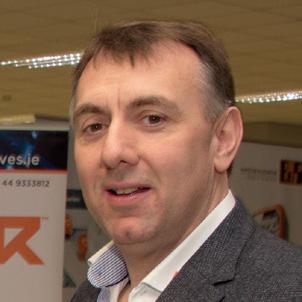
Skills challenge
There are skills challenges to overcome, and Lynch cites Irish MedTech Association research highlighting the need for upskilling and reskilling. A separate Google and Amárach survey found that national investment in digital skills could add €9.5 billion to Ireland’s economy in the next three years. However, few SMEs felt they had the requisite skills to adopt new technology, and the majority are ‘less than halfway’ on their digital journey.
Within this skills shortage debate, the MedTech report also identified that 92% of companies saw robotics as critical. “With skills development, we cannot wait for a new generation to come through because it is happening too rapidly,” he says. “We will also need to upskill or reskill people in mid-career. We’ve seen how supply constraints can inhibit growth, and this is an even more acute issue as skilled resources are less fungible than goods.”
Role of robotics
Technology provider ABB is looking to participate in upskilling and has a designated robotics training facility but also recognises its role in removing technical barriers. Core to this is a so-called ‘low code’ approach that involves removing some of the technical hurdles.
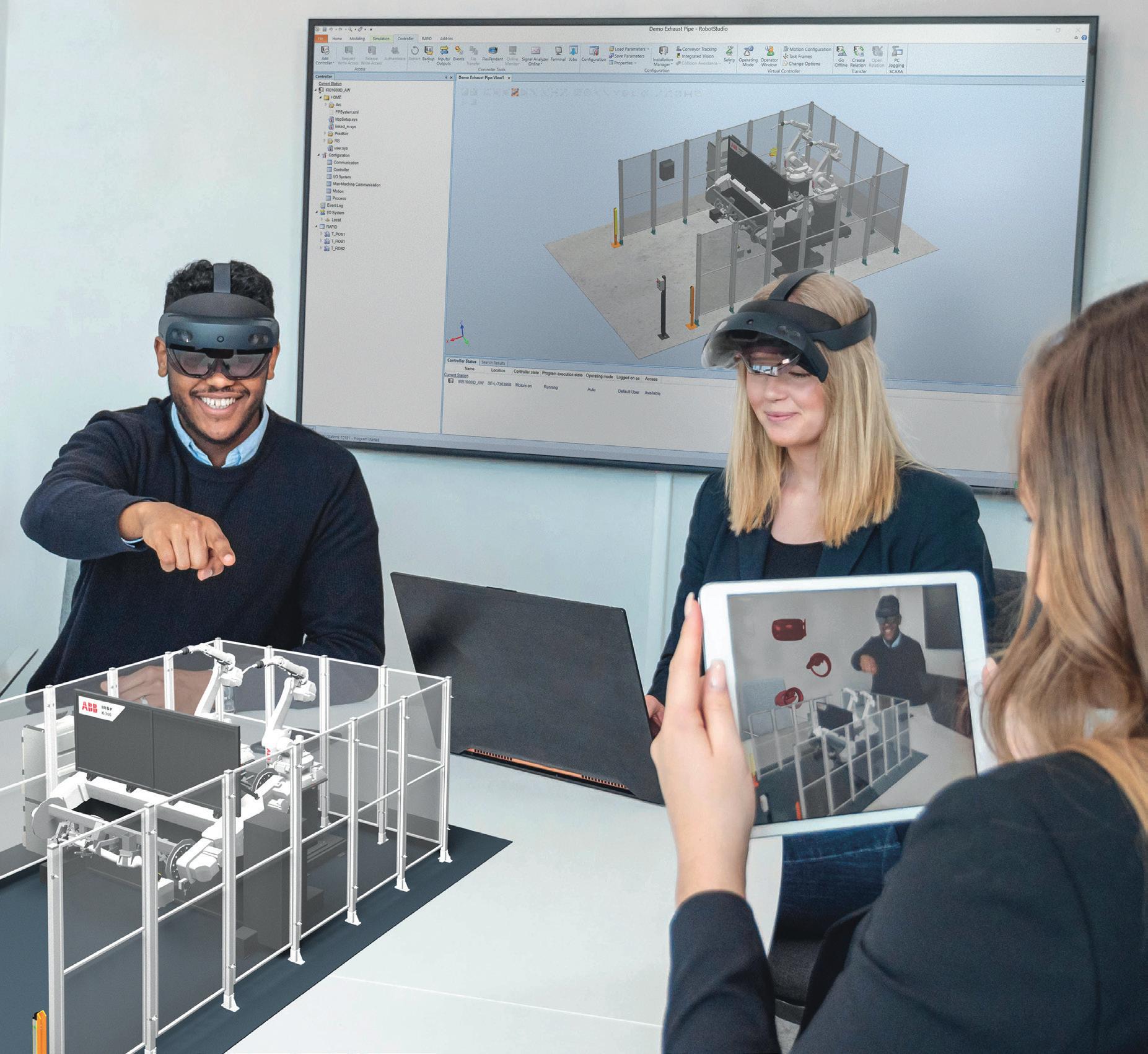
Ireland is uniquely primed to capitalise on the benefits of advanced manufacturing.
Industry expert Dermot Lynch believes Ireland is “meeting its moment” within industrial digitalisation. However, he also adds a note of caution, highlighting hurdles in skills development that need to be overcome.

Industrial legacy
One reason the Irish market is wellplaced to capitalise on the benefits of advanced digitalisation is that it is ‘unencumbered by a long industrial legacy’ which acts as ‘ballast’ to innovation in mature markets.
“Ireland is primed to ‘leapfrog’ these markets in a technological sense,” suggests Lynch. “The sectoral balance of medtech, biopharma and electronics delivers a ‘baked-in’ bias to technological innovation.” He also points to the collegiate engagement in Irish industry, which makes it easier to convene smaller groups to work on problems.
Benefits of generalism
Irish manufacturing’s proximity to the tech industry — which has a strong presence in the country and a focus on generalism — offers further advantages. “Larger economies can have a sectoral specialisation that drives technology providers to specify for a sector, such as the automotive industry. Culturally, there is a tendency to privilege the status quo,” explains Lynch, who is Head of Business Development for electrification and automation specialists — ABB.
Their Irish partners such as Robotics & Drives Services (RDS) have benefitted from serving a wide market base, generating a value-adding approach to innovation. Co-founder, Stephen Nolan, recognises the opportunity for Ireland to become a global centre of excellence in areas such as robotics. “When we started in 2005, robot sales were in the single digits, domestically. Now, the domestic market is over 100 robots per year, and 80% of our current business is export-related,” says Nolan.
Lynch gave the example of changing a robot’s function that previously would have required an expert to reprogramme the code. Solutions, such as ‘lead-through programming,’ mean anyone can reprogramme by physically moving a robot and clicking a button to automatically write the code for that new movement. He says: “The ultimate objective is to relieve skills bottlenecks and shorten the distance from vision to actualisation. We are at the point where people can programme without prior training.”
Stealing a lead ABB and its subsidiary B&R Automation are also contracted to provide a digital factory at the Advanced Manufacturing Centre (AMC) in Limerick, working with local partners (the Malone Group, Bonners, RDS & KAON Automation) to showcase the latest in advanced digital technology. “We look across the globe and the vision from the IDA and AMC teams is unparalleled. It will deliver an asset to Irish manufacturing which will enhance Ireland’s comparative advantage in industrial digitalisation for years to come,” Lynch concludes.
MEDIAPLANET READ MORE AT BUSINESSNEWS.IE 05 AN INDEPENDENT SUPPLEMENT FROM MEDIAPLANET WHO TAKE SOLE RESPONSIBILITY FOR ITS CONTENT
A unique industrial landscape within Ireland is set to offer the country a clear lead in the advance digital manufacturing marketplace.
Find out more at new.abb.com/ie
Paid for by ABB
Dermot Lynch Head of Business Development, ABB, GB&I
WRITTEN BY
Mark Nicholls
Stephen Nolan Co-founder & Technical Director, Robotics & Drives Services (RDS)
Image provided by ABB
Matt Moran Director BioPharmaChem Ireland
How digitisation and sustainability can boost Irish biopharma manufacturing
The manufacturing sector plays a vital role in the Irish economy as a leading exporter and employer.
BioPharmaChem Ireland (BPCI) has just published its strategy for the sector (2023–2027). The sector is diverse and manufactures a range of materials from chemicals, medicinal products and biotech substances to products based on cell and gene therapies or advanced pharmaceutical products. BPCI prioritises themes that have a direct impact on the manufacturing sector.
Pharma 5.0
The two most significant challenges facing Europe over the next decade are the transition towards a climate-neutral society and the retention of our industrial competitiveness. Pharma 5.0 can help drive this twin transition and involves the interpretation of Industry 4.0 technologies through a human-centric lens.
It broadens the focus from solely shareholder value to value for all stakeholders in society and greater resilience — particularly in supply chains and the manufacturing of strategically important goods. Recent disruptions have shown the importance of Europe being more self-reliant and flexible in manufacturing and supply to adapt to changing conditions.
Active pharmaceutical ingredients (APIs)
Manufacturing APIs is critical for the future of pharmaceutical manufacturing in Europe. Ireland has a strong API sector; it is important that it stays competitive and continues to grow. The recent
announcement by AstraZeneca to invest $360 million in a state-of-the-art digitised API facility in Dublin will help to hasten the future of the sector here.
Irish API sites will continue to transform through upskilling staff, investing in new technology platforms and manufacturing processes to be flexible, agile and at the cutting edge of API production.
Advanced therapeutic products
Advanced therapeutic products, such as cell and gene therapies (CGT) represent a significant opportunity for the Irish biopharma sector. The recent opening of the cell therapy production unit by Takeda in Grange Castle represents another important milestone.
CGT will provide a good platform of indigenous Irish companies to become involved in the overall Life Sciences cluster — a cluster that tends to be dominated by multinational companies. Already, Maynooth-based company Avectas and Dublin-based APC/VLE are developing quickly in the field, bringing platform technologies and contract research into the space.
The industry awaits the upcoming report from the Expert Group on Future Skills Needs which will provide an analysis of the skills landscape in the country and a set of recommendations on how the industry can ensure that its growth will be supported by the right kind of talent base. Our education and training base must be closely aligned with the needs of the industry.
Helping Irish companies tackle technology adoption challenges
Industry 4.0 (I4.0) describes the ongoing evolution of manufacturing around the world. It is an attempt to characterise the impact of a suite of digital technologies that have reached maturity — being mainstream and economically accessible to companies.
Maurice O’Connell Chief Operations Officer, Irish Manufacturing Research


The primary technologies included under the I4.0 banner are robotics, sensors, computing (AI, storage, cloud), additive manufacturing, AR/VR and digital twin/simulation.
Where forward-looking companies should be
The contention with Industry 4.0 is that we are living in a technology revolution where the rate of change is fast-paced and disruptive. Laggards may be adversely impacted if they do not embrace these new technologies. The assertion is that I4.0 has the power to radically transform how products are created, how supply chains are managed and how products are delivered.
The primary challenge for companies is: What exactly do I need to do, and how do I do it? Few companies start with a blank sheet in terms of technology implementation, but it can be challenging to develop a technology roadmap and implementation plan to deliver improved economic performance and meet current business needs.
Laggards may be adversely impacted if they do not embrace these new technologies.
Assessing where your company is and what to do Using a digital maturity model can help you determine where your company is on the path to digital transformation. Irish Manufacturing Research (IMR) use the Smart Industry Readiness Index (SIRI) to help companies identify key technology improvement priorities and identify a roadmap framework. In 2020, SIRI was adopted by the World Economic Forum as its recommended I4.0 maturity model for all member countries and organisations.
It comprises a suite of frameworks and tools to help manufacturers — regardless of size and industry — to start, scale and sustain their manufacturing transformation journeys. It examines the three core areas of process, technology and organisation. Very often, process and organisation are not considered important. Managers dive into the technology without understanding processes and people can often underwrite the failure of technology implementation.
Insights from comprehensive assessments
IMR conducted 34 SIRI assessments across a wide range of sectors including meat processing, heavy industry and advanced electronics. The primary opportunities emerging are Vertical Integration, Shopfloor Intelligence, Workforce L&D and Enterprise Intelligence. This reflects the need for ICT infrastructure and capabilities to enable value from company assets.
SIRI offers a global database where companies can benchmark against best in class across 16 dimensions in relevant sectors. The assessments can play a catalytic role in accelerating the digital transformation of the Irish manufacturing industry.
06 READ MORE AT BUSINESSNEWS.IE AN INDEPENDENT SUPPLEMENT FROM MEDIAPLANET WHO TAKE SOLE RESPONSIBILITY FOR ITS CONTENT MEDIAPLANET
Why investment in digital must be a priority for business success
Digital manufacturing is the future, but suppliers need the skills and raw materials to flourish today. Research demonstrates the benefits digitalisation can bring.
Manufacturers that invest in digital technology will become more efficient and competitive and boost their sustainability credentials, according to the I-Form Centre, which conducts high-impact research into how digital technology can be applied to materials processing.
Faster processes
Professor Denis Dowling Director, I-Form Centre
WRITTEN BY Steve Hemsley
Digital technology supports more Irish companies to install machines that can self-monitor, for example, and analyse and diagnose issues without the need for human intervention.
The I-Form Centre director, Professor Denis Dowling, who works alongside other academics and researchers, says manufacturers can see significant returns by using a technology platform that combines in-process data with artificial intelligence, which is also informed from previous processing runs.
“This is all part of the Industry 4.0 revolution,” he says. “Our research identifies ways of using digital tools to monitor and provide feedback from manufacturing processes. This results in increased manufactured part performance, as well as enhancements in process efficiency, sustainability and profitability.”
This SFI-funded research centre also works with European partners to develop sustainable manufacturing approaches such as remanufacturing. This is where used products are rebuilt to their original manufacturing specifications by combining reused, repaired as well as new parts. This money-saving approach is already widely applied in the aerospace and automobile sectors.
Skills needed
Manufacturers need assistance to fully benefit from digitalisation and adapt to several challenges, including evolving national and European legislation. There is also a lack of expertise in advanced manufacturing.
Demand is strong for manufacturing engineers and scientists with the right digital skills and factory floor workers who understand robotics, the Internet of Things (IoT) and artificial intelligence.
Another short-term dilemma is a growing shortage of critical raw materials, particularly metals. In Ireland, for example, the international supply shortage of titanium could damage the manufacturing output of some medical devices.
Sustainability boost
One major benefit of digital manufacturing is the positive impact it has on a manufacturer’s sustainability. Companies can quantify process emissions and process waste in real time and use predictive models to prevent the over-purchase of raw materials.
Approximately 12.5% of Irish greenhouse gas emissions are associated with manufacturing, but there is a target to reduce overall industry emissions by 35% by 2030. Under EU regulation, manufacturers must now have a transparent approach to sustainability reporting.
“Significant savings can be made by developing digital models of processes,” says Professor Dowling. “These can dramatically reduce the need for physical experiments by as much as 90%.”

I-Form is the SFI Research Centre for Advanced Manufacturing. Its mission is to shape the future of manufacturing through high-impact research into the application of digital technologies to materials processing.
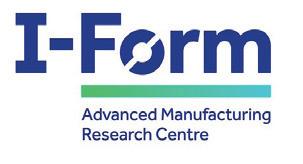
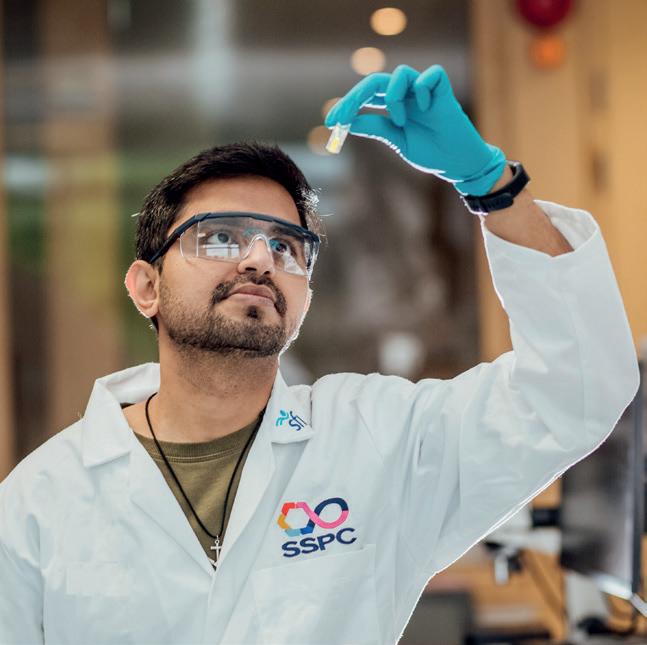
Find out more at i-form.ie
the process more efficient, you cut down the steps and time needed to do it. Doing things smarter makes them safer and more eco-friendly. Sustainability is not just on the agenda — it is the agenda.”
Digital transformation
Collaboration between academic research institutions and the pharmaceutical industry in Ireland is crucial in helping keep the sector ahead of international competition.
The pharmaceutical industry is critical to Ireland’s economy with 40% of exports from within the sector.
In a rapidly changing landscape, Ireland must stay ahead of the competition internationally — but sustainably. Core to this is the relationship between academic research institutions and the pharmaceutical industry.
Long-term challenges
pharma, it is about doing research that keeps our industry partners at the front,” says Thompson, who is Scientific Director at SSPC, the Science Foundation Ireland Research Centre for Pharmaceuticals, a hub of Irish research expertise developing innovative technologies to address challenges facing the pharmaceutical and biopharmaceutical industries.
He says digital transformation is massively important, with artificial intelligence, machine learning and natural language processing being adopted at ‘astounding speed’ by the pharmaceutical industry.
“It is streamlining and accelerating the production process,” explains Thompson. “Industry is aware that it produces huge amounts of data which it was not always able to digest. It is now putting that data to use as machines spot patterns instantaneously.”
Talent and technology
WRITTEN BY Mark Nicholls
Professor Damien Thompson highlights the research sector’s role in delivering high-quality multidisciplinary research that addresses long-term challenges in manufacturing. It can capture future needs and opportunities for emerging research areas such as personal medicines, product design, developing efficient manufacturing, vaccine research and novel diseases.
“As such a big part of Ireland’s economy depends critically on
Sustainable manufacturing Thompson, who is also a professor of molecular modelling at the University of Limerick, says the focus is on bringing ‘disruptive change’ to the manufacture of drug substances and products via end-to-end manufacturing methodologies.

An important advance is in flow chemistry and continuous manufacturing, rather than batch production.“That minimises waste, use of solvents and avoids intermediates that may lead to toxic by-products,” he says. “As you make
The role of universities is to produce graduates who will interface with these advances and “combine talent and technology.”
SSPC students work in teams developing core skills in wet lab techniques and data modelling, while the industry communicates its talent requirements. Society sees direct benefits of better, safer drugs with improved efficacy and decreased toxicity, improving patient compliance. Thompson says investing now to accelerate digital transformation will futureproof pharma manufacturing in Ireland.

MEDIAPLANET READ MORE AT BUSINESSNEWS.IE 07 AN INDEPENDENT SUPPLEMENT FROM MEDIAPLANET WHO TAKE SOLE RESPONSIBILITY FOR ITS CONTENT
How to ensure pharma manufacturing is efficient enough for the future
Find out more at sspc.ie/industry/
Professor Damien Thompson Director of SSPC, the Science Foundation Ireland Research Centre for Pharmaceuticals, University of Limerick
Paid for by SSPC
ImageprovidedbySSPC
Paid for by I-Form
Better planning and preparation for companies with digital twin technology
Creating digital twins of real-world operating processes and sites is helping companies sharpen working practices and design new models of practice.
Virtual reality scenarios can enable organisations to rehearse procedures, including worst-case events but without disruption, damage or cost to manufacturing procedures and operational flows. Digital twins are also scalable, from the smallest areas through to airports, factories or even whole cities.
Virtual worlds
Industry expert Dr Leo Rodriguez explains that digital twins can replicate real-life scenarios on a computer. The difference to a standard simulation is that a digital twin has a closed loop with the real-life system and receives and provides real-time information, accurately reflecting the current state and behaviour of the system.
Rodriguez, who is CEO and founder of Helgen Technologies, says: “The main benefit is that you can carry out tests that would typically require a lot of time and effort — but in a simplified manner, in a virtual world and as an alternative to traditional piloting and testing. The possibilities from digital twins are endless.”


Safety critical
A digital twin can be used to perform safety-critical tests. “That gives manufacturing companies a more in-depth understanding of the impacts of something going terribly wrong within their business,” he says.

As companies embark on digital transformation projects and realise the benefits of digital twin technology, Kerry-based Helgen Technologies has been able to replicate the entirety of a container port, a logistics centre and an agricultural site for customers, as well as making complex evaluations of machinery and redefining workflows.
Contained process
Digital twins mean the process is contained and less time-consuming. The company’s Chief Science Officer, Dr Aldo Arriaga, says: “We are creating a solution that essentially gives superpowers to companies. We’re giving them the power to travel through time and predict the future, all thanks to a virtual world where it’s possible to test new technologies, simulate different scenarios and gather key data on the process.”
Cost reduction
There are also cost benefits in using a digital twin for startup companies that want to stage tests with a major organisation, as well as enabling OEMs (original equipment manufacturers) to run pilots with ports, logistics centres or manufacturing sites at a fraction of the cost for both parties.
Helgen Technologies — which creates digital twins based on measurements and site blueprints — helped reduce the rollout of a complex automation project for one firm with impressive results. The rollout time was cut from six to three-and-a-half years, leading to a reduction in both cost and deployment time.

Using AI in design expands opportunities to free up resources
Buzzwords like AI, digital manufacture and advanced automation are often familiar, off-the-shelf technologies waiting to be picked up and used.
‘Digital manufacturing pipeline’ describes the steps involved in the generation, manipulation and conversion of digital part-data when making a physical part. For every manufacturing step, there is corresponding data from a digital operation (ie: .PRT with Design, .STP/coordinate code for machining and inspection programming, .CSV reporting measurement). Automating these steps offers increased productivity, self-correcting machining and, ultimately, lights-out manufacture.
You can create your own digital pipeline
Most design software now allows some automation. Examples include automatic CAD and drawing generation by parametric design or generative design of a new shape from user requirements and manufacturing constraints. Some extend into the manufacturing process by allowing for rules-based automation of tool pathing and inspection programming.
Alternatively, various, free tools are available to create rules-based scripts that run and operate different software packages, spread across multiple stages of a digital pipeline.
Expect AI solutions for process management to become increasingly common in the next 12–24 months.
Starting small and having fun builds skills
Writing scripts to automate end-to-end manufacturing is a big idea; but it breaks down into manageable chunks: (1) Draw a block diagram of the pipeline. (2) ID inputs/outputs of each stage. (3) Automate processes within each software. (4) Trial different methods to run between stages/software packages.
By breaking the problem down into chunks, starting with a (very) simple proof of concept and engaging multiple skill sets, it might be surprising how far a team can get in automating a digital manufacturing pipeline by using existing software, hardware and staff.
AI allows a robust automated process
Most automation in manufacturing is currently rules-based and user scripted. However, Artificial Intelligence (AI) has been overtaking rules-based programming in other engineering activities such as webpage generation. This is because AI programmes are much more effective at self-correcting when faced with ‘outside the box’ challenges. Expect AI solutions for process management to become increasingly common in the next 12–24 months.
out more at helgen.tech
Automating design and manufacture offers significant opportunities for freeing up personnel and equipment resources, increasing productivity and decreasing scrap. Building the skills in-house to apply these methods at will using the resources to hand increases this competitive edge. Having these systems in place to incorporate AI and Machine Based Reasoning (MBR) allows automation to be much more widely applicable. All of this can be possible by challenging a few interested engineers with a low-cost ‘for fun’ project.
08 READ MORE AT BUSINESSNEWS.IE AN INDEPENDENT SUPPLEMENT FROM MEDIAPLANET WHO TAKE SOLE RESPONSIBILITY FOR ITS CONTENT MEDIAPLANET
Tristan McCallum Advanced Manufacturing Technologist, Irish Manufacturing Research
Paid for by Helgen Technologies
Dr Aldo Arriaga Chief Science Officer, Helgen Technologies
Find
Dr Leo Rodríguez Chief Executive Officer and Founder, Helgen Technologies
WRITTEN BY Mark Nicholls
Electricity 4.0 is here and cannot be ignored
Simulation with digital twins
Manufacturers must also think about circularity when considering new concepts so that more products can be recycled. “When a product comes to the end of its life, there needs to be a process in place to get it back into a factory and refurbished using the latest technology,” says Collins.
He also wants to see more investment in universal automation to free up employees to focus on the things they are good at and to speed up the manufacturing process from ideas to production.
“We are already seeing examples when constructing factories. We can create a digital twin at the design phase and simulate how a building will react under different environmental constraints,” he adds. “We can simulate using various materials and calculate how these would impact the carbon footprint of the facility as we aim for net zero targets.”
The global energy crisis has put Ireland’s manufacturers under pressure — but by being open to change, the future is bright.
Electricity 4.0 is not just a buzz phrase. It offers Ireland’s manufacturers a positive future. Manufacturers must think differently about how they use electricity and embrace change, says global energy management company Schneider Electric.
Careful decision-making
towards a decarbonised electrical supply. This could mean considering new meter options.
WRITTEN BY Steve Hemsley
The company’s country president, Chris Collins, believes Ireland has some major decisions to take over the next few years to ensure its power source is decarbonised, digitised and decentralised.

“We have to look again at how we produce and consume electricity — and embrace new business models,” he says. “Many manufacturers have seen the utility costs increase four or five-fold, but this is as much about future resilience — and keeping manufacturing plants operating and avoiding blackouts — as it is about cost.”
This is why the industry talks about Electricity 4.0 and how producers should rethink how energy is sourced, used and wasted by them and by their customers. Ultimately, companies will need to have a better understanding of their current energy spending to be able to devise energy reduction strategies and move
On-site electricity generation Schneider Electric’s next-generation solutions include the introduction of microgrids. These are self-contained electrical networks that enable manufacturers to generate their own electricity on-site.

The microgrid connects, monitors and controls a facility’s energy resources while boosting sustainability and resilience. Having a microgrid also means a producer can react to rising and falling energy prices. Early adopters of microgrids include hospitals, data centres and other facilities where power reliability and resiliency are essential.
Collins cites the example of the company’s operation in Grenoble, France where it had 19 buildings that were inefficient in terms of energy. It consolidated everything into five buildings on a new site which now produces 102% of the electricity it consumes. There is solar and wind power generation on-site and energy storage facilities. The site is also connected to the grid for renewables and is feeding electricity into the city of Grenoble.
Embracing AI for the economy Investing in automation also means investing in artificial intelligence (AI) and embracing the Internet of Things to connect different parts of the manufacturing process. “Humans do not have the capacity to sift through all the data that is being generated nowadays, so this is where AI comes in. It can help manufacturers to make real-time decisions that increase productivity and make production lines more efficient,” says Collins.
As Ireland’s manufacturers accept the need for change and the country becomes a global leader in Electricity 4.0, then it will boost the wider economy.
“Ireland has the skills and a track record in this area plus an educated workforce,” adds Collins. “If you are a pharmaceutical company looking for somewhere to build your next life sciences plant, for example, then we know that Ireland can demonstrate that it has the expertise to execute that project.”
MEDIAPLANET READ MORE AT BUSINESSNEWS.IE 09 AN INDEPENDENT SUPPLEMENT FROM MEDIAPLANET WHO TAKE SOLE RESPONSIBILITY FOR ITS CONTENT
Scan the QR code to find out more
Chris Collins Country President, Schneider Electric Ireland by Schneider
Paid
for
Electric
When a product comes to the end of its life, there needs to be a process in place to get it back into a factory and refurbished using the latest technology.
While Ireland will likely avoid a recession, households and businesses will feel the slowdown in many of our major trading partners.
The international economy is in a place of significant challenge. High rates of inflation, rising interest rates, accelerated monetary tightening and volatile energy markets are all softening economic forecasts.
Deteriorating sector
Results of a new, major survey from Ibec show a drop in confidence in the manufacturing sector for the next six months compared with the same period last year. It identifies the cost of energy as the number one challenge for manufacturing businesses in Ireland, followed by supply chain issues and access to labour.

The survey shows that the manufacturing environment in Ireland is felt to have deteriorated considerably between 2021 and 2022. Among respondents, the ‘very good’ and ‘good’ ratings have gone from 89% to 53%.
Optimistic leaders
Commenting on the report, Sharon Higgins, Executive Director, Membership and Sectors says: “This report spotlights our members’ priorities over the next period. We know confidence is down significantly, which is understandable given the current issues; although, it is interesting that our members are more bullish about their own businesses than the wider economy, most notably in the medtech and biopharma sectors. Business leaders (65% of them) — mostly from the pharma and medtech sectors — continue to be more optimistic about the prospects for their own businesses, currently.”
Focus on strengths and improvement
Manufacturing, as diverse and resilient as it is, will require support from the Government to keep the sector competitive and thriving. Ireland must anticipate this by never staying still ourselves; as well as nurturing our business-friendly environment, we also need to take care of the social infrastructure that is key to being a great place to live and work. This includes addressing housing, broadband and transport infrastructure. We also know how important it is to focus on education so that access to talent remains one of our key strengths.
Ways to create sustainable practices in the food supply chain
As growing populations generate the need for increased food production, the food industry needs an expanded supply of quality raw materials.
In terms of supply, there is a concern about how the industry can respond to the growing demand in quality and yield gains, which are affected by factors such as the changing climate, water shortages, land usage and diminished returns for agricultural producers.
Increasing sustainability concerns Food supply chains are complex as they include different levels of actors, from those who produce and aggregate to those who add value to the product through processing and those who sell into wholesale and retail. There are also different crops and food types, each with its own distinctive and often fragmented supply chain. Moreover, consumers are not just concerned about food safety standards but are increasingly conscious of their food’s provenance — paying particular attention to whether it is produced responsibly and sustainably from farm to fork.
Benefitting business and the planet
Sustainability in the food supply chain is about lowering the impact of food production on the natural environment as materials move through the supply chain from farm to processor to warehouse to table. It is also about reducing food waste throughout this process.
Sustainability is essential across the entire food supply chain. Inefficiencies in one area can increase costs in another. So, an industry-wide commitment to sustainability is the best approach. For both business and environmental reasons, more companies are looking for ways to improve sustainability throughout the food supply chain.
How technology can help Technology has always had an influence on food production. Some new technologies that can help make the food chain more sustainable include artificial intelligence and machine learning, embedded systems to control things like water usage and advanced processing equipment to reduce waste and the consumption of resources. Furthermore, using high-quality, modern equipment can lower energy consumption and production costs and reduce overall waste.
Long-term impact
Water is a scarce resource, and a focus on limiting water consumption should be a sustainability priority. Businesses can limit water use when washing equipment/ingredients and not letting taps run when not in use.
Sustainability is of vital concern to consumers, businesses and governments. One of the critical components of sustainability is efficient food supply chain management. Putting the right practices and technology in place to minimise waste and streamline the supply chain can boost sustainability and save costs and improve overall business results.
Simon McKeever Chief Executive, Irish Exporters Association

10 READ MORE AT BUSINESSNEWS.IE AN INDEPENDENT SUPPLEMENT FROM MEDIAPLANET WHO TAKE SOLE RESPONSIBILITY FOR ITS CONTENT MEDIAPLANET
One of the critical components of sustainability is efficient food supply chain management.
Manufacturing sector survey shows cost of energy is the biggest 2023 challenge
Sharon Higgins
Executive Director, Membership and Sectors, Ibec
The benefits of a circular economy in decarbonising Irish food systems
Transitioning towards a circular economy is crucial to increasing resilience across global and Irish food systems, safeguarding food security and meeting sustainability goals.
Global issues such as pandemics and the changing climate can threaten food security and safety everywhere. But by transitioning to a more sustainable, resilient food system, we can “ensure food is safe and available to everyone, everywhere, with a reduced environmental impact,” says Artur Dannenberg, Key Account Director at Tetra Pak, UK and Ireland. One way to achieve this is by adopting a low-carbon circular economy which considers the climate impact of raw materials and the manufacturing value chain.

Food that’s fresh and safe Part of this transformation requires producing food and drink in a way that ensures it is safe to consume,
with a lower carbon impact. Artur explains: “To make food systems better for the planet, it’s not just the packaging we have to think about — it’s how we process products too. We need to ensure products have as long a shelf life as possible while putting the systems in place to allow materials to be recycled and reused.”
Improving recycling
Beyond processing, one of the biggest components of a circular economy is recycling. Tetra Pak is working with local councils and government policymakers to encourage higher rates of recycling, where the necessary infrastructure exists.

Much needs to be done to promote education around sustainability and recycling at all levels — consumer,
government and business. “Progress is absolutely a joint effort. As leaders in the packaging industry, we must ensure we’re sharing our knowledge with others and supporting them where we can. But we also need to learn from them. Companies must forge meaningful partnerships with all stakeholders in the food system, to create mutually beneficial networks.”
Innovating for good When it comes to decarbonising food systems, innovation is essential.
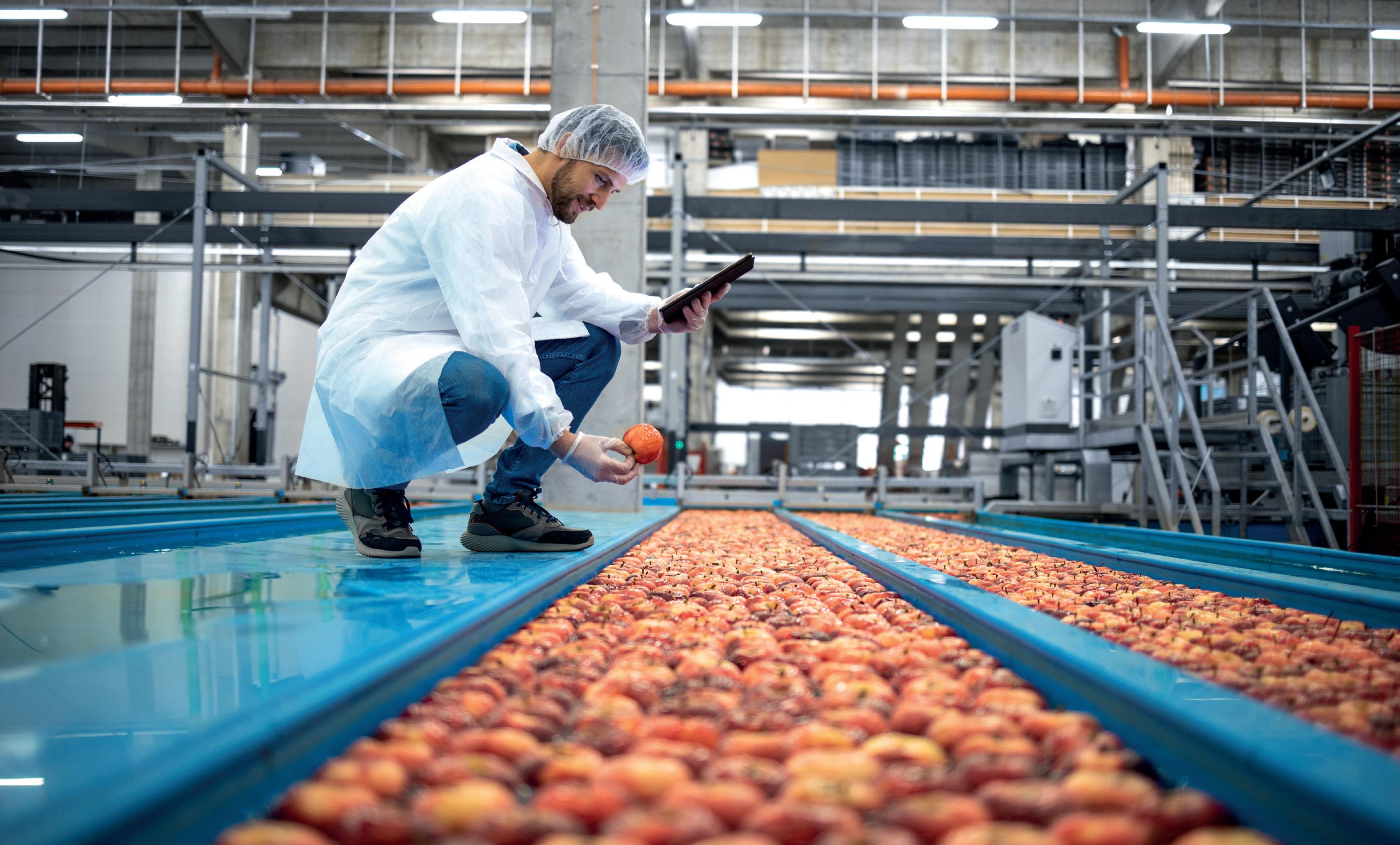

Currently, Tetra Pak’s carton packages are used across Ireland and Europe to offer consumers safe, fresh food and drink options in predominantly plant-based packaging. But its ambition goes further.
The company is seeking to create the world’s most sustainable food package — a carton package made of renewable or recycled materials that are responsibly sourced. To help achieve this, it is investing €100 million per year over the next 5–10 years to develop more sustainable packaging solutions.
That’s because being a leader in sustainable packaging goes further than business. “When it comes to sustainability, we’re not just looking at it from a profitability perspective, but also how we can benefit society,” Artur concludes.
MEDIAPLANET READ MORE AT BUSINESSNEWS.IE 11 AN INDEPENDENT SUPPLEMENT FROM MEDIAPLANET WHO TAKE SOLE RESPONSIBILITY FOR ITS CONTENT
to
more Paid for by Tetra Pak
Artur Dannenberg Key Account Director, UK and Ireland, Tetra Pak Scan
the QR
find out
WRITTEN BY Sarah Brown
Manufacturing, as diverse and resilient as it is, will require support from the Government to keep the sector competitive and thriving.
~Sharon Higgins, Executive Director, Membership and Sectors, Ibec
How universities are helping the manufacturing industry meet its needs
Close links between Technological Universities and industry in Ireland are supporting manufacturers to better develop processes and products. It is important that universities deliver a workforce with the relevant skills to meet the needs of industry. TUS (Technological University of The Shannon) with more than 15,000 students and almost 100,00 students across it Regional University Network (RUN-EU) has a wide and growing rapport with industry clients.
The university conducts high-impact national and international research and has a proven track record for the delivery of technology solutions to industry in the manufacturing domain with a particular focus on Engineering, Polymer, Biotechnology and ICT. Engaging with and responding to needs by tailoring courses and providing expert technology solutions is core to its partnerships across industry and society.
Shaping skills for industry needs
Industry expert Brian Lee outlines how that is being achieved across the TUS Midwest and Midlands region. University courses are shaped to match the skills needs of industry, often in response to specific feedback from the manufacturing sector.
A framework of organisations involving Technology Gateways and clusters of like-minded SMEs and multinational companies, ensure regular two-way information flow and bridge the critical gap between industry and university. “The clusters are key to ensuring that we understand and have insight into the needs of companies,” he adds. “All that feeds back into the development of a comprehensive set of courses.”
Lee is the Director of the Athlone-based Software Research Institute with multiple campus locations. “It is about offering a full suite of solutions for industry while simultaneously training highly skilled researchers who can transfer knowledge directly to future employers,” he adds.

“It is a holistic offering, and we are all very tuned in to make sure we have that end-to-end offering on skills, research and delivery of solutions and innovation,” says Lee.
Collaborative ecosystem meeting industry needs
Jamie Meehan is cluster manager of the IDEAM (Irish Digital Engineering Advanced Manufacturing) cluster, which supports precision engineering, aerospace and

medical device companies through digitalisation and green transition.
“We meet with industry to do a needs analysis and develop our strategic offerings based on those needs in areas of talent and skills, leadership and digitalisation to support these companies,” he says. Meehan sees the university is continuing to grow its collaborative ecosystem to support future industry needs. “The whole ethos is active-based industry learning,” he says. ATIM (Advanced Technologies in Manufacturing) cluster manager Caitriona Mordan sees ATIM as providing “boots on the ground” to enable companies to access support within the university for digital and sustainability adoption.
One-stop shop
The Technology Gateways, which sit between the clusters and the research, provide engineering solutions to companies in areas such as AI, digital transformation, biotechnology and polymer development. TUS has a core expertise in polymer and plastics innovation in Ireland.

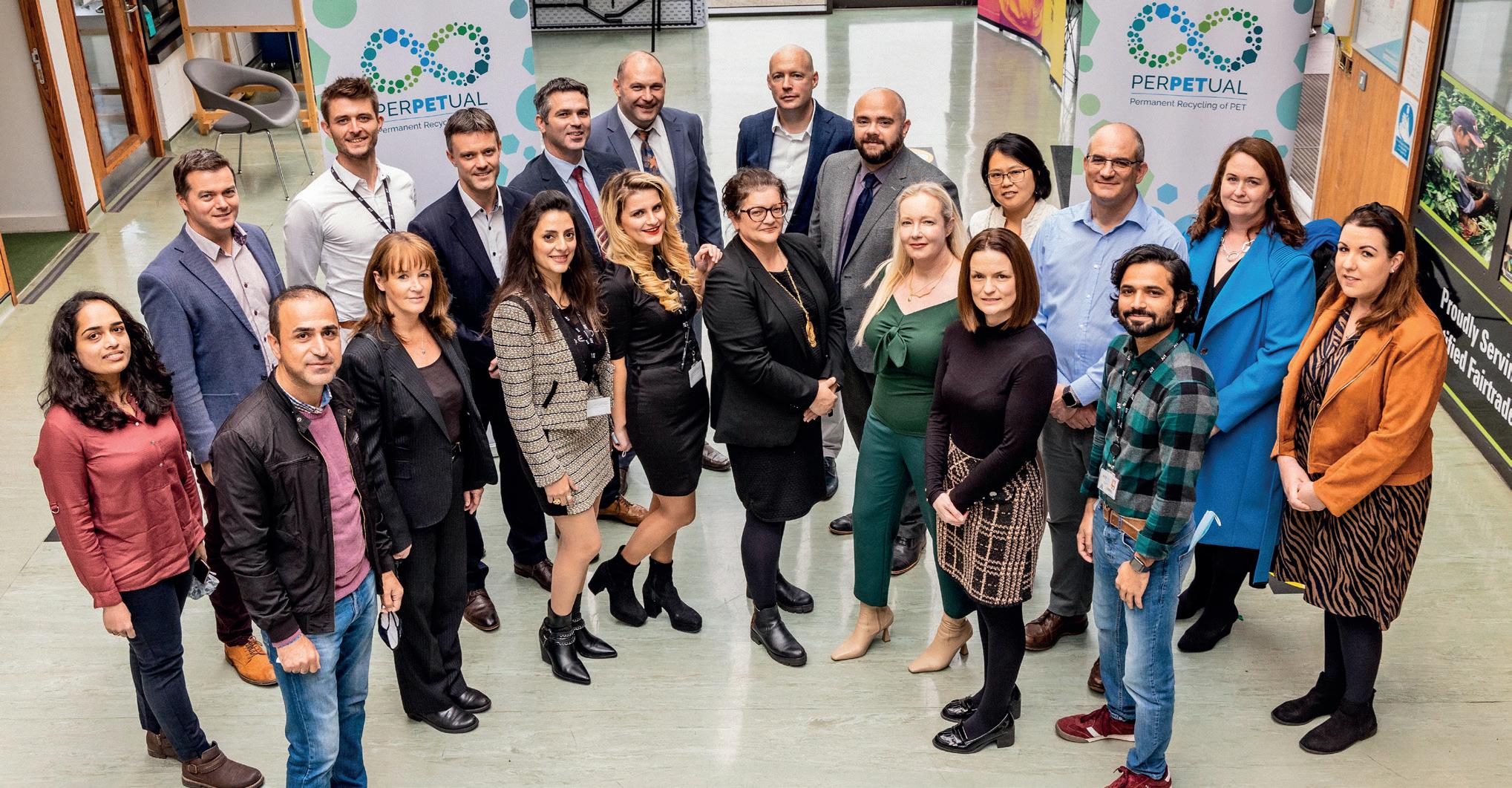
Margaret Brennan Fournet, Assistant Director of the Polymer Recycling Innovation Sustainability and Manufacturing (PRISM) Research Institute, says an aim is to help manufacturing industries achieve sustainability for their products and processes.


The technologies include new low-carbon eco plastics generation and using waste postconsumer plastics as a resource for conversion to new plastics without further fossil fuel extraction. “Our PerPETual technology provides indefinite recycling for PET Plastics and is used in drinks bottles, food packaging and textiles. Working with companies with these sustainable technologies serves to strengthen their competitiveness, facilitate job retention and create new circular value chains,” she says.
“Our skills and solutions offering is needs-led, and we listen to those companies,” says Lee. “Our message to companies is ‘we are a one-stop shop for your needs and have the mechanisms in place to deliver what you need.’”
12 READ MORE AT BUSINESSNEWS.IE AN INDEPENDENT SUPPLEMENT FROM MEDIAPLANET WHO TAKE SOLE RESPONSIBILITY FOR ITS CONTENT MEDIAPLANET Find out more at prism.tus.ie
A unique ecosystem linking education and industry is enabling universities to shape courses that will deliver future talent with the relevant skill sets manufacturers are seeking.
Caitriona Mordan, Manager, Advanced Technologies in Manufacturing (ATIM) Cluster
Paid for by Technological University of the Shannon
The whole ethos is active-based industry learning.
Dr. Jamie Meehan, Cluster Manager, IDEAM (National Advanced Manufacturing Cluster in Ireland)
Dr. Margaret Brennan Fournet Assistant Director, PRISM Research Institute
Brian Lee Director, Software Research Institute
Image provided by PRISM Research Institute
WRITTEN BY Mark Nicholls








































